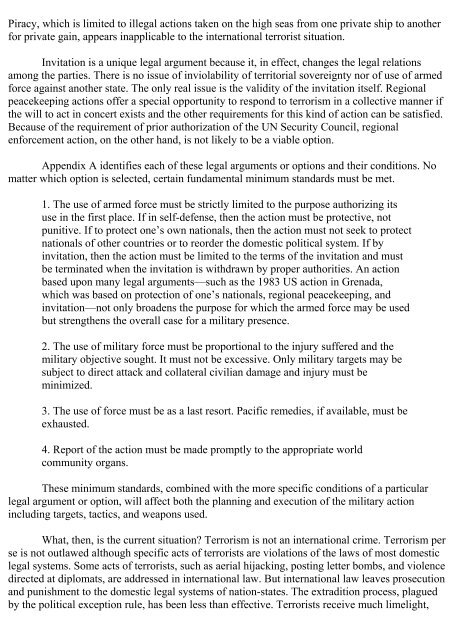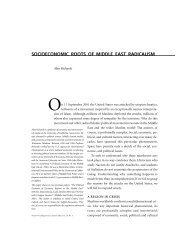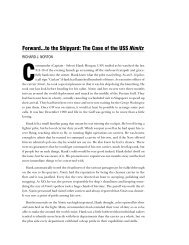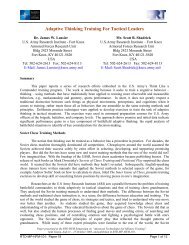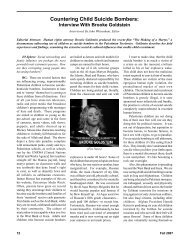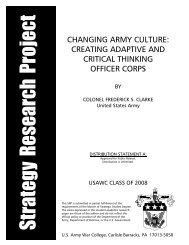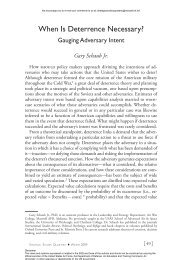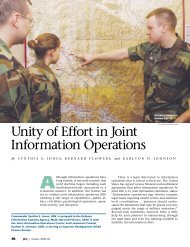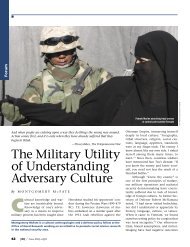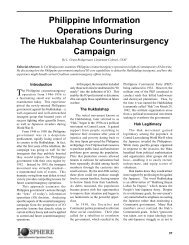Legitimate use of military force against state-sponsored - Air University
Legitimate use of military force against state-sponsored - Air University
Legitimate use of military force against state-sponsored - Air University
Create successful ePaper yourself
Turn your PDF publications into a flip-book with our unique Google optimized e-Paper software.
Piracy, which is limited to illegal actions taken on the high seas from one private ship to another<br />
for private gain, appears inapplicable to the international terrorist situation.<br />
Invitation is a unique legal argument beca<strong>use</strong> it, in effect, changes the legal relations<br />
among the parties. There is no issue <strong>of</strong> inviolability <strong>of</strong> territorial sovereignty nor <strong>of</strong> <strong>use</strong> <strong>of</strong> armed<br />
<strong>force</strong> <strong>against</strong> another <strong>state</strong>. The only real issue is the validity <strong>of</strong> the invitation itself. Regional<br />
peacekeeping actions <strong>of</strong>fer a special opportunity to respond to terrorism in a collective manner if<br />
the will to act in concert exists and the other requirements for this kind <strong>of</strong> action can be satisfied.<br />
Beca<strong>use</strong> <strong>of</strong> the requirement <strong>of</strong> prior authorization <strong>of</strong> the UN Security Council, regional<br />
en<strong>force</strong>ment action, on the other hand, is not likely to be a viable option.<br />
Appendix A identifies each <strong>of</strong> these legal arguments or options and their conditions. No<br />
matter which option is selected, certain fundamental minimum standards must be met.<br />
1. The <strong>use</strong> <strong>of</strong> armed <strong>force</strong> must be strictly limited to the purpose authorizing its<br />
<strong>use</strong> in the first place. If in self-defense, then the action must be protective, not<br />
punitive. If to protect one’s own nationals, then the action must not seek to protect<br />
nationals <strong>of</strong> other countries or to reorder the domestic political system. If by<br />
invitation, then the action must be limited to the terms <strong>of</strong> the invitation and must<br />
be terminated when the invitation is withdrawn by proper authorities. An action<br />
based upon many legal arguments—such as the 1983 US action in Grenada,<br />
which was based on protection <strong>of</strong> one’s nationals, regional peacekeeping, and<br />
invitation—not only broadens the purpose for which the armed <strong>force</strong> may be <strong>use</strong>d<br />
but strengthens the overall case for a <strong>military</strong> presence.<br />
2. The <strong>use</strong> <strong>of</strong> <strong>military</strong> <strong>force</strong> must be proportional to the injury suffered and the<br />
<strong>military</strong> objective sought. It must not be excessive. Only <strong>military</strong> targets may be<br />
subject to direct attack and collateral civilian damage and injury must be<br />
minimized.<br />
3. The <strong>use</strong> <strong>of</strong> <strong>force</strong> must be as a last resort. Pacific remedies, if available, must be<br />
exhausted.<br />
4. Report <strong>of</strong> the action must be made promptly to the appropriate world<br />
community organs.<br />
These minimum standards, combined with the more specific conditions <strong>of</strong> a particular<br />
legal argument or option, will affect both the planning and execution <strong>of</strong> the <strong>military</strong> action<br />
including targets, tactics, and weapons <strong>use</strong>d.<br />
What, then, is the current situation? Terrorism is not an international crime. Terrorism per<br />
se is not outlawed although specific acts <strong>of</strong> terrorists are violations <strong>of</strong> the laws <strong>of</strong> most domestic<br />
legal systems. Some acts <strong>of</strong> terrorists, such as aerial hijacking, posting letter bombs, and violence<br />
directed at diplomats, are addressed in international law. But international law leaves prosecution<br />
and punishment to the domestic legal systems <strong>of</strong> nation-<strong>state</strong>s. The extradition process, plagued<br />
by the political exception rule, has been less than effective. Terrorists receive much limelight,


